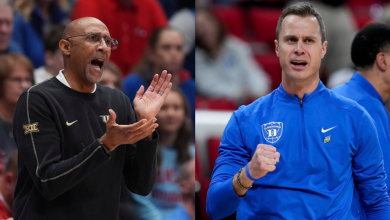Facing an 0-2 Stanley Cup Final deficit, Connor McDavid and the Oilers confront a critical “dig in” moment

The chilling reality of the Stanley Cup Final often sets in with the stark clarity of the scoreboard. For Connor McDavid and the Edmonton Oilers in the 2024 iteration, that moment arrived with the cold, hard fact of an 0-2 series deficit against the relentless Florida Panthers. Two games down, both played in Sunrise, Florida, and now the challenge shifted dramatically to their home ice in Edmonton. This wasn’t just a setback; it was a critical “dig in” moment, demanding every ounce of resilience, leadership, and collective will the franchise could muster.
In the cutthroat world of NHL playoffs, an 0-2 hole in the Stanley Cup Final is a chasm. Historically, teams falling behind by two games have won the series only a handful of times, making the task monumental. For the Oilers, a team that had battled through adversity all season, this was not merely another challenge; it was the ultimate test of their character, their strategy, and the very foundation of their identity.
The Depth of the Hole: How the Oilers Unraveled Early
Games 1 and 2 in Florida exposed the Oilers to the full force of the Panthers’ suffocating system, a defensive masterclass that seemed to short-circuit Edmonton’s vaunted offense.
Game 1 was a goaltending clinic by Sergei Bobrovsky, who turned aside all 32 shots from the Oilers’ potent attack. Despite outshooting Florida significantly, Edmonton couldn’t solve the veteran netminder, falling 3-0. The Panthers capitalized on opportunistic scoring, showcasing their ability to generate offense even when outplayed territorially. The Oilers’ power play, a consistent weapon throughout the playoffs, was rendered impotent.
Game 2 brought a different dynamic but a similar outcome. The Panthers continued their physical onslaught, and while the Oilers did manage to score, they found themselves in a penalty-filled affair that seemed to favor Florida’s style. Discipline became a major issue, as the Oilers racked up unnecessary penalties, giving the Panthers power-play opportunities they eventually converted. The frustration mounted, and the Oilers visibly unraveled at times, leading to a lopsided 4-1 defeat.
The key takeaways from the first two games were grim for Edmonton:
- Offensive Stifling: McDavid, Leon Draisaitl, and the Oilers’ offensive juggernaut were largely neutralized at 5-on-5. High-danger chances were few, and when they did come, Bobrovsky was impenetrable.
- Special Teams Disparity: The Oilers’ lethal power play, which had been operating at an elite level, went cold. Conversely, the Panthers’ power play, while not dominant, capitalized on Edmonton’s penalties.
- Physical Dominance: Florida dictated the terms of engagement, out-hitting and out-muscling the Oilers, consistently winning puck battles along the boards and in front of the net. This physicality seemed to throw the Oilers off their game.
- Goaltending Edge: While Stuart Skinner was solid in moments, Bobrovsky’s performance in Game 1 was legendary, setting a high bar that Skinner struggled to consistently match.
What “Dig In” Truly Means: Beyond the Cliché
In sports, “dig in” is often tossed around as a cliché, but for a team facing an 0-2 deficit in a best-of-seven series, it takes on profound meaning. It’s not just about trying harder; it’s a multi-faceted imperative involving psychological, tactical, and collective adjustments:
- Mental Fortitude and Composure: The first step is to block out the noise, the pressure, and the mounting frustration. It means not allowing mistakes, penalties, or the opponent’s antics to derail focus. For the Oilers, especially in Game 2, emotions ran high, leading to costly errors. “Digging in” here means maintaining an even keel, regardless of the score or the physicality.
- Tactical Adaptations: The Panthers’ suffocating forecheck and tight-checking defense exposed vulnerabilities. “Digging in” requires the coaching staff to make crucial adjustments to breakouts, offensive zone entries, and defensive structure to counter Florida’s strengths. It also means finding ways to generate offense without sacrificing defensive integrity.
- Collective Accountability: Every player, from the captain to the fourth-line grinder, must take ownership of their performance. There’s no room for finger-pointing or self-pity. “Digging in” means uniting as a cohesive unit, supporting one another, and pulling in the same direction with renewed purpose.
- Relentless Effort and Sacrifice: This goes beyond simple hard work. It means sacrificing bodies to block shots, battling ferociously for pucks, winning face-offs, and relentlessly pursuing every loose puck. It’s about outworking the opponent shift after shift, wearing them down.
- Reclaiming Identity: The Oilers’ identity is built on speed, skill, and a potent power play. They need to “dig in” and return to the principles that made them successful, playing to their strengths while minimizing weaknesses exploited by Florida.
Connor McDavid’s Defining Moment
As captain and the league’s undeniable superstar, the weight of this “dig in” moment falls most heavily on Connor McDavid’s shoulders. His leadership, both by example on the ice and through his composure off it, becomes paramount.
McDavid is renowned for his ability to elevate his game when it matters most. He has single-handedly willed the Oilers through countless tough situations in the past. Now, with the ultimate prize within reach but rapidly slipping away, his performance and leadership would be under unprecedented scrutiny. He needed to find ways to break through Florida’s smothering defense, to create space for himself and his teammates, and to ignite the Oilers’ dormant offense.
His public demeanor, as evidenced by his calm comments on Sam Bennett’s aggression, reflected a player determined not to be rattled. This composure was a crucial aspect of his leadership; if the captain remains calm, the team has a better chance to follow suit. However, his individual offensive output in the first two games was uncharacteristically low, and while he excels as a playmaker, the Oilers needed him to be a primary scoring threat.
Key Areas for the Oilers to “Dig In”
To reverse the 0-2 deficit, the Oilers needed to “dig in” in several critical areas:
- Offensive Breakthrough: The Oilers’ top players, including McDavid and Draisaitl, needed to find a way to consistently generate high-danger chances against Bobrovsky. This meant more than just cycling the puck; it required creative entries, quick passes, and a willingness to get to the dirty areas around the net. Secondary scoring from lines two through four also became non-negotiable.
- Power Play Revival: Edmonton’s power play had been virtually unstoppable through the first three rounds. Against Florida, it faltered significantly. “Digging in” on special teams meant sharper passes, quicker puck movement, and a renewed killer instinct with the man advantage. Converting on power plays was essential to breaking through Bobrovsky and gaining momentum.
- Defensive Discipline: The parade to the penalty box in Game 2 was catastrophic. The Oilers needed to play with an edge, but not a reckless one. “Digging in” on discipline meant understanding the officiating, avoiding retaliatory penalties, and playing smarter in their own zone. This would keep their best players on the ice and limit Florida’s power-play opportunities.
- Goaltending Consistency: While not solely to blame, Stuart Skinner needed to match Bobrovsky’s brilliance. “Digging in” for Skinner meant shaking off any jitters, making the timely saves, and giving his team the confidence to play aggressively in front of him.
- Matching Florida’s Intensity: The Panthers dictated the physical terms in the first two games. The Oilers needed to “dig in” and meet that physicality head-on, winning more board battles, finishing checks, and protecting their net front, but doing so within the rules to avoid penalties.
- Leveraging Home Ice Advantage: The shift to Rogers Place in Edmonton for Games 3 and 4 provided a vital opportunity. The passionate “Orange Crush” faithful would be a significant factor, providing an emotional boost. “Digging in” at home meant feeding off that energy, playing with renewed confidence, and making it an intimidating environment for the Panthers.
The Historical Challenge and the Stakes
Historically, coming back from an 0-2 deficit in the Stanley Cup Final is an exceptionally rare feat. Only five teams in NHL history have managed to do so, underscoring the immense challenge facing the Oilers. This statistical reality added another layer of pressure, turning the “dig in” moment into a potential date with destiny or a grim historical footnote.
The stakes for the Oilers franchise were immense. They had not won a Stanley Cup since 1990 and carried the burden of decades of anticipation. For McDavid, Draisaitl, and the core group, this was their best chance yet. A failure to “dig in” would not only mean losing the Cup but also raising uncomfortable questions about their ability to perform when it mattered most. The legacy of this Oilers team, and particularly its captain, hung in the balance.
Conclusion: A Defining Moment of Resilience
Facing an 0-2 deficit in the Stanley Cup Final, Connor McDavid and the Edmonton Oilers were confronted with the ultimate test of their collective will. It was a “dig in” moment in every sense of the phrase – a psychological battle, a tactical puzzle, and a demand for unwavering commitment. While the odds were stacked against them, the opportunity to etch their names in history as one of the greatest comeback teams remained. The next few games weren’t just about winning; they were about finding the resolve, discipline, and sheer determination to climb out of the deepest hole and keep their Stanley Cup dreams alive. The hockey world watched, eager to see if McDavid and the Oilers could truly answer the call to “dig in.”









